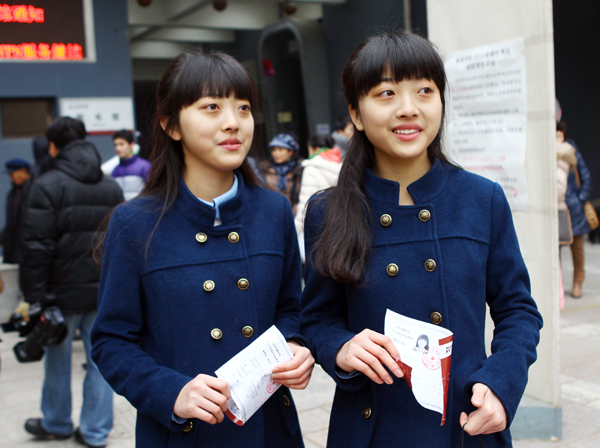
 'Taken 2' grabs movie box office crown
'Taken 2' grabs movie box office crown
 Rihanna's 'Diamonds' tops UK pop chart
Rihanna's 'Diamonds' tops UK pop chart
 Fans get look at vintage Rolling Stones
Fans get look at vintage Rolling Stones
 Celebrities attend Power of Women event
Celebrities attend Power of Women event
 Ang Lee breaks 'every rule' to make unlikely new Life of Pi film
Ang Lee breaks 'every rule' to make unlikely new Life of Pi film
 Rihanna almost thrown out of nightclub
Rihanna almost thrown out of nightclub
 'Dark Knight' wins weekend box office
'Dark Knight' wins weekend box office
 'Total Recall' stars gather in Beverly Hills
'Total Recall' stars gather in Beverly Hills
Reaching for the stars
Updated: 2013-02-27 09:02
By Liu Wei and Han Bingbin (China Daily)
|
||||||||
 |
|
Zhang Lin (left) and her twin sister Zhang Lu from Beijing prepare for the preliminary acting exam. |
Zhao Ningyu, professor at the Communication University of China's directing and acting department, and a graduate of Beijing Film Academy himself, calls the training "misleading".
"Now all the students play the same roles in the test - thieves, lunatics and fools are the most popular ones," he says.
Usually the acting exams include reading a poem, singing, dancing and a short skit.
Zhao has discovered that many applicants have spent a whole year preparing one poem or a dance sequence. When asked to do something impromptu, they panic.
Those who travel from outside Beijing have to rent houses to attend the training classes and the exams that follow.
Ma Junzhen, a 60-year-old former cleaner at the Central Academy of Drama, earns at least 3,600 yuan a month renting out her modest 9-square-meter lodging nearby.
Feeding the star fever is the booming entertainment industry of China. The annual film box-office sales have risen 30 percent since 2003 to reach 16 billion yuan ($2.57 billion) in 2012. The second largest film market in the world, only after the United States, offers not just dreams, but real jobs.
The most likely way for them to enter the industry is to enter a prestigious acting school, which is very difficult in China.
"Although about 400 colleges in China have acting courses, few of them are able to offer really quality art education," says Zhao of the Communication University of China.
"As a result, the diplomas of the few top colleges, such as Central Academy of Drama and Beijing Film Academy, are widely seen as having high credibility in show business. Graduates of the two schools are more likely to have access to jobs and useful connections, either through teachers, classmates or alumni."
Most Viewed
Editor's Picks

|

|

|

|

|

|
Today's Top News
Boston bombing suspect reported cornered on boat
7.0-magnitude quake hits Sichuan
Cross-talk artist helps to spread the word
'Green' awareness levels drop in Beijing
Palace Museum spruces up
First couple on Time's list of most influential
H7N9 flu transmission studied
Trading channels 'need to broaden'
US Weekly

|

|







